翻译实训九
翻译实训报告
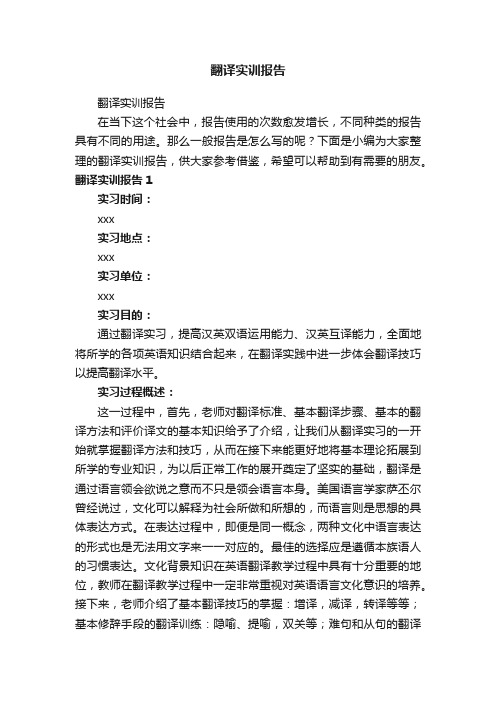
翻译实训报告翻译实训报告在当下这个社会中,报告使用的次数愈发增长,不同种类的报告具有不同的用途。
那么一般报告是怎么写的呢?下面是小编为大家整理的翻译实训报告,供大家参考借鉴,希望可以帮助到有需要的朋友。
翻译实训报告1实习时间:xxx实习地点:xxx实习单位:xxx实习目的:通过翻译实习,提高汉英双语运用能力、汉英互译能力,全面地将所学的各项英语知识结合起来,在翻译实践中进一步体会翻译技巧以提高翻译水平。
实习过程概述:这一过程中,首先,老师对翻译标准、基本翻译步骤、基本的翻译方法和评价译文的基本知识给予了介绍,让我们从翻译实习的一开始就掌握翻译方法和技巧,从而在接下来能更好地将基本理论拓展到所学的专业知识,为以后正常工作的展开奠定了坚实的基础,翻译是通过语言领会欲说之意而不只是领会语言本身。
美国语言学家萨丕尔曾经说过,文化可以解释为社会所做和所想的,而语言则是思想的具体表达方式。
在表达过程中,即便是同一概念,两种文化中语言表达的形式也是无法用文字来一一对应的。
最佳的选择应是遵循本族语人的习惯表达。
文化背景知识在英语翻译教学过程中具有十分重要的地位,教师在翻译教学过程中一定非常重视对英语语言文化意识的培养。
接下来,老师介绍了基本翻译技巧的掌握:增译,减译,转译等等;基本修辞手段的翻译训练:隐喻、提喻,双关等;难句和从句的翻译训练:定语从句、状语从句、名词性从句等以及进行了一些特殊句式和惯用语的翻译训练,从语言篇章的角度训练翻译过程中语篇的连贯和衔接。
这次翻译实习,我们是以小组为单位,大家分工合作。
我意识到团队精神teamwork的重要性。
我们每个人都只翻译其中的某几页,但是要想翻译,我们必须对范文充分了解,和组员多多交流别的章节的内容。
其次,范文中的人名和地名,如果每个人都只按自己的理解翻译,那么翻译的结果将是五花八门,读者读起来将不知所云。
简单来说,翻译是一个双向的过程,即输入→处理→输出。
光我自己看懂是远远不够的,还必须真正了解作品,并把作品用大家易于接受的文字表达出来。
翻译实践报告实训内容(精选9篇)

翻译实践报告实训内容(精选9篇)(经典版)编制人:__________________审核人:__________________审批人:__________________编制单位:__________________编制时间:____年____月____日序言下载提示:该文档是本店铺精心编制而成的,希望大家下载后,能够帮助大家解决实际问题。
文档下载后可定制修改,请根据实际需要进行调整和使用,谢谢!并且,本店铺为大家提供各种类型的经典范文,如职场文书、公文写作、党团资料、总结报告、演讲致辞、合同协议、条据书信、心得体会、教学资料、其他范文等等,想了解不同范文格式和写法,敬请关注!Download tips: This document is carefully compiled by this editor. I hope that after you download it, it can help you solve practical problems. The document can be customized and modified after downloading, please adjust and use it according to actual needs, thank you!Moreover, this store provides various types of classic sample essays for everyone, such as workplace documents, official document writing, party and youth information, summary reports, speeches, contract agreements, documentary letters, experiences, teaching materials, other sample essays, etc. If you want to learn about different sample formats and writing methods, please pay attention!翻译实践报告实训内容(精选9篇)报告是一种常见的书面形式,用于传达信息、分析问题和提出建议。
商英09商务英语翻译实训

商英09商务英语翻译实训
侯扬扬
英译汉
1.80多年来,卡勒彼勒有限公司已经建立了世界的基础设施,并且和
世界范围的经销商网络建立了合伙关系,而且在每一个欧洲大陆上都驱使着积极的,可持续的变化。
随着2005年的销售及收入为363.4亿美元,卡勒彼勒是科学技术的领导者和世界领先的建筑物制造商涉及采矿设备,柴油机,天然气发动机和工业的汽轮机。
2005年销售及收入363.4亿美元增加了60.3亿美元,或者是20%。
从2004年收入的增加导致了37.2亿美元的高额销售量,提高了18.27亿美元的价格变卖和增加了3.64亿美元的金融产品收入。
大约有一半的销售是给在美国境外的客户,是来保持卡勒彼勒作为一个全球供应商和主要的美国出口商的位置。
2.国旅
国旅给外国旅客提供了有趣的旅游项目,包括有丰富的中国名族特色和地方色彩。
在他们呆在中国期间,外国旅游将有机会去参观世界文明的自然景点和历史遗址,并且欣赏珍贵的古物和宏伟的古建筑。
他们也可以参观工厂,学校,医院和乡村,并且可以和不同国籍的中国人交流,以至于他们能够学到关于用锄劳作的中国人民在社会主义物质文明和精神文明,他们是如何生活和工作以及他们的风俗习惯。
另外,外国游客可以欣赏中国戏剧,杂技,歌曲和舞蹈,而且也可以品尝到中国菜肴和地方小吃。
对于那些专业人员,当他们来中国旅游的时候,有可能是指导科学,技术或者是文化交流。
汉译英。
翻译实践报告7篇
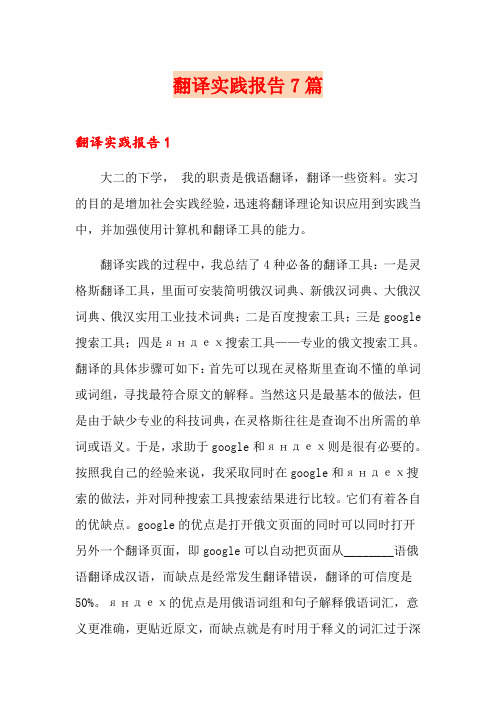
翻译实践报告7篇翻译实践报告1大二的下学,我的职责是俄语翻译,翻译一些资料。
实习的目的是增加社会实践经验,迅速将翻译理论知识应用到实践当中,并加强使用计算机和翻译工具的能力。
翻译实践的过程中,我总结了4种必备的翻译工具:一是灵格斯翻译工具,里面可安装简明俄汉词典、新俄汉词典、大俄汉词典、俄汉实用工业技术词典;二是百度搜索工具;三是google 搜索工具;四是яндех搜索工具——专业的俄文搜索工具。
翻译的具体步骤可如下:首先可以现在灵格斯里查询不懂的单词或词组,寻找最符合原文的解释。
当然这只是最基本的做法,但是由于缺少专业的科技词典,在灵格斯往往是查询不出所需的单词或语义。
于是,求助于google和яндех则是很有必要的。
按照我自己的经验来说,我采取同时在google和яндех搜索的做法,并对同种搜索工具搜索结果进行比较。
它们有着各自的优缺点。
google的优点是打开俄文页面的同时可以同时打开另外一个翻译页面,即google可以自动把页面从________语俄语翻译成汉语,而缺点是经常发生翻译错误,翻译的可信度是50%。
яндех的优点是用俄语词组和句子解释俄语词汇,意义更准确,更贴近原文,而缺点就是有时用于释义的词汇过于深奥,过于专业,相当于用更专业的词汇解释专业词汇,即难上加难。
所以我认为最后就需要用到百度工具了。
结合google和яндех的参考翻译,用百度搜索翻译过的专业词汇,查看是否有相同或相近的专业用语,之后才确定出最准确的译法。
自己校对,虚心地向本专业的老师和材料学院的老师请教。
首先进行的自己去校对。
原以为会限于“当局者迷”之说而不懂查看、修改自己的译文。
但认真看完一遍译文之后才知道自己的眼睛还算是锐利的,检查出不少错误。
比如最明显的一处是有一个句子翻译得不通顺,如果是一个没看过原文的人肯定是看不懂得。
还有专业术语的译错。
但错的最离谱的是编辑排版上的错误。
于是我反复对照原文和译文之后,及时把发现的错误都改了过来。
商务英语翻译实训chapter 9 Translation of Product Directions共24页

Linguistic Features of Product Directions
5)Do not remove tabs. 不要移动手环。 6)Pull black lever towards you. 拉回黑杆。 7)NEVER use insect repellents on wounds or
◆Use in well—ventilated areas.
Linguistic Features of Product Directions
产品说明书是生产厂家用来向消费者介绍说 明商品性质、性能、结构、用途、规格、使用方 法、保养、注意事项、质量保证、销售范围和免 责声明等的实用文本,属于典型的科技文体,英 文产品说明书除具有科技文体的普遍特点外还有 其自身的特点。
◆Avoid contact.with eyes.If it gets into the eyes, flush with water for at least 15 minutes and consult a physician.
◆Wear robber gloves during use.
◆Do not use or mix together with any other household cleaners or bleaches.
Linguistic Features of Product Directions
4. 句式简单 产品说明书多使用简单句式,常用句式有以下几种
:
*(情态动词)be + 形容词(或过去分词)+目的状 语
该句型主要用于文章的开头,说明该产品是做什么 用的。例如:
10)The product is used for creating your own hair style special for creating your look and shaping beautiful hair.
翻译实习心得
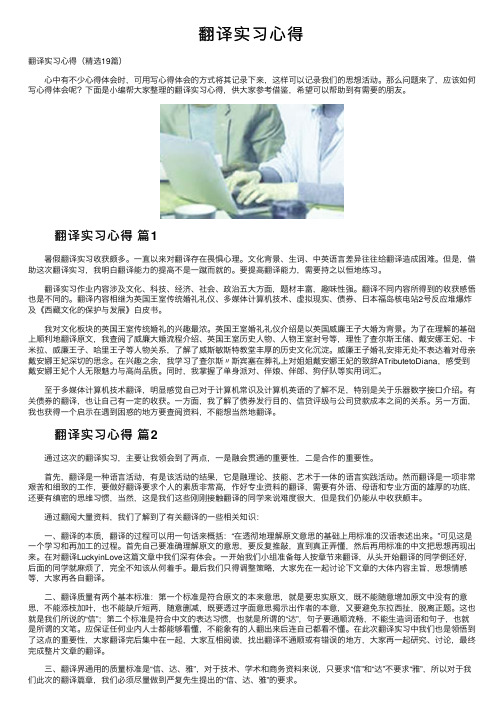
翻译实习⼼得翻译实习⼼得(精选19篇) ⼼中有不少⼼得体会时,可⽤写⼼得体会的⽅式将其记录下来,这样可以记录我们的思想活动。
那么问题来了,应该如何写⼼得体会呢?下⾯是⼩编帮⼤家整理的翻译实习⼼得,供⼤家参考借鉴,希望可以帮助到有需要的朋友。
翻译实习⼼得篇1 暑假翻译实习收获颇多。
⼀直以来对翻译存在畏惧⼼理。
⽂化背景、⽣词、中英语⾔差异往往给翻译造成困难。
但是,借助这次翻译实习,我明⽩翻译能⼒的提⾼不是⼀蹴⽽就的。
要提⾼翻译能⼒,需要持之以恒地练习。
翻译实习作业内容涉及⽂化、科技、经济、社会、政治五⼤⽅⾯,题材丰富,趣味性强。
翻译不同内容所得到的收获感悟也是不同的。
翻译内容相继为英国王室传统婚礼礼仪、多媒体计算机技术、虚拟现实、债券、⽇本福岛核电站2号反应堆爆炸及《西藏⽂化的保护与发展》⽩⽪书。
我对⽂化板块的英国王室传统婚礼的兴趣最浓。
英国王室婚礼礼仪介绍是以英国威廉王⼦⼤婚为背景。
为了在理解的基础上顺利地翻译原⽂,我查阅了威廉⼤婚流程介绍、英国王室历史⼈物、⼈物王室封号等,理性了查尔斯王储、戴安娜王妃、卡⽶拉、威廉王⼦、哈⾥王⼦等⼈物关系,了解了威斯敏斯特教堂丰厚的历史⽂化沉淀。
威廉王⼦婚礼安排⽆处不表达着对母亲戴安娜王妃深切的思念。
在兴趣之余,我学习了查尔斯〃斯宾塞在葬礼上对姐姐戴安娜王妃的致辞ATributetoDiana,感受到戴安娜王妃个⼈⽆限魅⼒与⾼尚品质。
同时,我掌握了单⾝派对、伴娘、伴郎、狗仔队等实⽤词汇。
⾄于多媒体计算机技术翻译,明显感觉⾃⼰对于计算机常识及计算机英语的了解不⾜,特别是关于乐器数字接⼝介绍。
有关债券的翻译,也让⾃⼰有⼀定的收获。
⼀⽅⾯,我了解了债券发⾏⽬的、信贷评级与公司贷款成本之间的关系。
另⼀⽅⾯,我也获得⼀个启⽰在遇到困惑的地⽅要查阅资料,不能想当然地翻译。
翻译实习⼼得篇2 通过这次的翻译实习,主要让我领会到了两点,⼀是融会贯通的重要性,⼆是合作的重要性。
商务英语翻译实训chapter 9 Translation of Product Directions

◆Do not use or mix together with any other household cleaners or bleaches.
◆Use in 2020/5/10well—ventilated areas.
Linguistic Features of Product Directions 产品说明书是生产厂家用来向消费者介绍说
2020/5/10
Techniques of Translating Product Directions 2) Add sugar and milk to taste.
加入适量的牛奶和糖,味道更佳。 3) A nourishing beverage for all ages. An excellent
irritated skin. 切勿在伤口或发炎的皮肤上使用驱虫剂。
2020/5/10
Linguistic Features of Product Directions
3. 大量使用被动句,例如: 8)The products can be installed in several types
such as cabinet,vertical racks, horizontal racks,ground placement and installed with other kinds of power supply cabinet according to user’s requirements. 产品可根据用户需要采用柜式、立架式、卧式、地面 摆放及与其它电源柜内置式使用等各种形式。 9)The tabs should not be removed 手环不应该被移动
英语翻译实习报告4篇
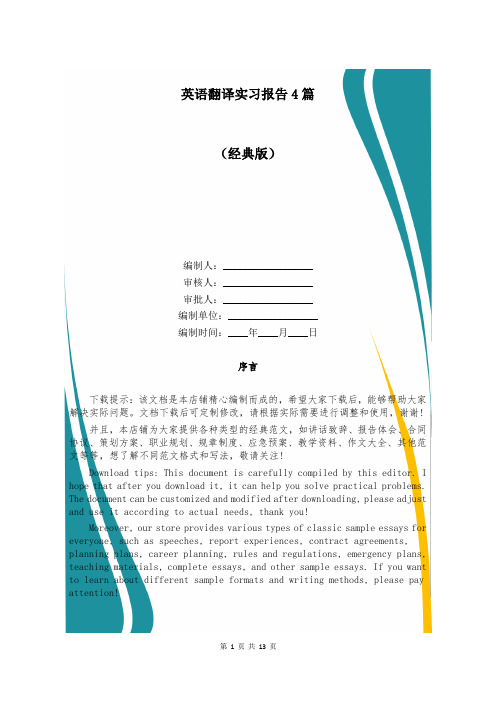
英语翻译实习报告4篇(经典版)编制人:__________________审核人:__________________审批人:__________________编制单位:__________________编制时间:____年____月____日序言下载提示:该文档是本店铺精心编制而成的,希望大家下载后,能够帮助大家解决实际问题。
文档下载后可定制修改,请根据实际需要进行调整和使用,谢谢!并且,本店铺为大家提供各种类型的经典范文,如讲话致辞、报告体会、合同协议、策划方案、职业规划、规章制度、应急预案、教学资料、作文大全、其他范文等等,想了解不同范文格式和写法,敬请关注!Download tips: This document is carefully compiled by this editor. I hope that after you download it, it can help you solve practical problems. The document can be customized and modified after downloading, please adjust and use it according to actual needs, thank you!Moreover, our store provides various types of classic sample essays for everyone, such as speeches, report experiences, contract agreements, planning plans, career planning, rules and regulations, emergency plans, teaching materials, complete essays, and other sample essays. If you want to learn about different sample formats and writing methods, please pay attention!英语翻译实习报告4篇下面是本店铺整理的英语翻译实习报告4篇(翻译实训报告英文),供大家阅读。
翻译专业实训报告(通用5篇)

翻译专业实训报告翻译专业实训报告(通用5篇)在生活中,报告与我们愈发关系密切,多数报告都是在事情做完或发生后撰写的。
那么什么样的报告才是有效的呢?下面是小编帮大家整理的翻译专业实训报告(通用5篇),供大家参考借鉴,希望可以帮助到有需要的朋友。
翻译专业实训报告1一、实习目的:为了使自己更加深入了解英语在社会和实际工作中的应用,丰富已学过的专业课内容,培养理论联系实际的能力,提高在语言应用中分析问题及解决问题的实际能力。
为了更好地为完成毕业论文打下基础,为了以后工作的顺利进行。
通过实习,还应了解英语在外贸,及涉外和服务行业中的重要地位,了解和积累更多的实践经验,培养热爱专业,献身国家建设的思想。
我们使用相关专业课教材,及实习单位提供的相关材料通过参与一个完整的笔译过程(资料,情报翻译)或口译过程(涉外接待,贸易谈判等),使自己掌握和提高熟练使用英语的技能。
翻译单位是本市唯一的一家经工商局审批注册的专为国内外各机构和个人提供专业翻译服务的企业。
拥有各行业的专业翻译人员、高级审译顾问、外籍专家、审译人员、留学回国人员等组成的优秀工作团队。
本单位坚持“以人为本”的指导思想,本着“团结拼搏,勇创一流”的精神,恪守“追求卓越挑战极限”的原则,积极为焦作地区的经济、文化和对外交流与发展,作出我们应有的贡献。
单位长期对外承接的翻译服务有:英、日、法、俄、德、韩、蒙、越南、阿拉伯、西班牙、意大利,等近40种语种与汉语不同形式的笔译,陪同口译,交替传译,同声传译等业务。
涉及机械、化工、汽车、金融、文学等各个领域。
我们实行的是“翻译—副译审—总译审”的三级质量管理体系。
合理的翻译运作流程、严格的质量控制体系、独特的翻译员审核标准以及完善的跟踪回访服务是我们优质翻译的保证。
我们始终信守诚实做人,踏实做事的原则。
秉承“竭诚为客户服务”的宗旨,用我们的辛勤工作换来沟通无限和您的微笑。
二、翻译过程的基本环节与具体要求(一)实际翻译程序可以归纳如下:1、快速翻译,侧重文体。
翻译实训报告心得体会(精选18篇)
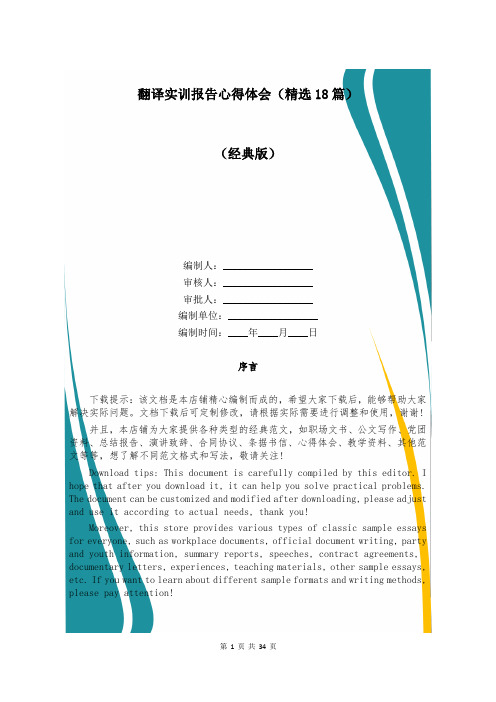
翻译实训报告心得体会(精选18篇)(经典版)编制人:__________________审核人:__________________审批人:__________________编制单位:__________________编制时间:____年____月____日序言下载提示:该文档是本店铺精心编制而成的,希望大家下载后,能够帮助大家解决实际问题。
文档下载后可定制修改,请根据实际需要进行调整和使用,谢谢!并且,本店铺为大家提供各种类型的经典范文,如职场文书、公文写作、党团资料、总结报告、演讲致辞、合同协议、条据书信、心得体会、教学资料、其他范文等等,想了解不同范文格式和写法,敬请关注!Download tips: This document is carefully compiled by this editor. I hope that after you download it, it can help you solve practical problems. The document can be customized and modified after downloading, please adjust and use it according to actual needs, thank you!Moreover, this store provides various types of classic sample essays for everyone, such as workplace documents, official document writing, party and youth information, summary reports, speeches, contract agreements, documentary letters, experiences, teaching materials, other sample essays, etc. If you want to learn about different sample formats and writing methods, please pay attention!翻译实训报告心得体会(精选18篇)在工作生活中,写下自己的心得体会有助于提高自我认知和改进工作方法。
翻译工作的实习报告

翻译工作的实习报告翻译工作的实习报告七篇在当下这个社会中,报告十分的重要,报告包含标题、正文、结尾等。
其实写报告并没有想象中那么难,以下是小编帮大家整理的翻译工作的实习报告7篇,供大家参考借鉴,希望可以帮助到有需要的朋友。
翻译工作的实习报告篇1一、实习目的实习目的是,通过英语翻译相关工作岗位实习使我了解以后再英语翻译相关工作岗位工作的特点、性质,学习体验英语翻译相关岗位工作的实际情况,学习与积累工作经验,为以后真正走上英语翻译相关工作岗位做好岗前准备。
同时通过英语翻译相关工作岗位的实习,熟悉实际工作过程的运作体系和管理流程,把自己所学英语翻译工作岗位理论知识应用于实际,锻炼英语翻译工作岗位业务能力和社会交际实践能力,并在工作中学习英语翻译相关工作岗位的新知识,对自己所学的知识进行总结并提升,以指导未来在英语翻译相关工作岗位的学习重点和发展方向。
二、实习时间201×年03月01日~201×年06月15日(修改成自己英语翻译相关工作岗位实习时间)三、实习地点苏州市经济开发区江南大道(修改成自己英语翻译工作岗位实习地点)四、实习单位江苏省苏杭教育集团(修改成自己英语翻译相关工作岗位实习单位) 此处可以继续添加具体你英语翻译工作岗位实习单位的详细介绍五、实习主要内容我很荣幸进入江苏省苏杭教育集团(修改成自己英语翻译相关工作岗位实习单位)开展英语翻译岗位实习。
为了更好地适应从没有英语翻译岗位工作经验到一个具备完善业务水平的工作人员,实习单位主管领导首先给我们分发英语翻译相关工作岗位从业相关知识材料进行一些基础知识的自主学习,并安排专门的老前辈对英语翻译岗位所涉及的相关知识进行专项培训。
在实习过程,单位安排的了杜老师作为实习指导,杜老师是位非常和蔼亲切的人,他从事英语翻译相关工作岗位领域工作已经有二十年。
他先带领我们熟悉实习工作环境和英语翻译相关工作岗位的工作职责和业务内容,之后他亲切的和我们交谈关于实习工作具体性质以及英语翻译相关工作岗位容易遇到的问题。
翻译专业实习工作总结5篇
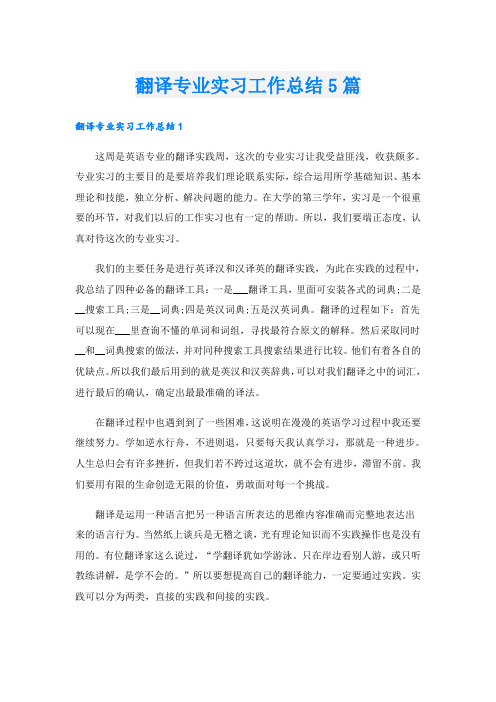
翻译专业实习工作总结5篇翻译专业实习工作总结1这周是英语专业的翻译实践周,这次的专业实习让我受益匪浅,收获颇多。
专业实习的主要目的是要培养我们理论联系实际,综合运用所学基础知识、基本理论和技能,独立分析、解决问题的能力。
在大学的第三学年,实习是一个很重要的环节,对我们以后的工作实习也有一定的帮助。
所以,我们要端正态度,认真对待这次的专业实习。
我们的主要任务是进行英译汉和汉译英的翻译实践,为此在实践的过程中,我总结了四种必备的翻译工具:一是___翻译工具,里面可安装各式的词典;二是__搜索工具;三是__词典;四是英汉词典;五是汉英词典。
翻译的过程如下:首先可以现在___里查询不懂的单词和词组,寻找最符合原文的解释。
然后采取同时__和__词典搜索的做法,并对同种搜索工具搜索结果进行比较。
他们有着各自的优缺点。
所以我们最后用到的就是英汉和汉英辞典,可以对我们翻译之中的词汇,进行最后的确认,确定出最最准确的译法。
在翻译过程中也遇到到了一些困难,这说明在漫漫的英语学习过程中我还要继续努力。
学如逆水行舟,不进则退,只要每天我认真学习,那就是一种进步。
人生总归会有许多挫折,但我们若不跨过这道坎,就不会有进步,滞留不前。
我们要用有限的生命创造无限的价值,勇敢面对每一个挑战。
翻译是运用一种语言把另一种语言所表达的思维内容准确而完整地表达出来的语言行为。
当然纸上谈兵是无稽之谈,光有理论知识而不实践操作也是没有用的。
有位翻译家这么说过,“学翻译犹如学游泳。
只在岸边看别人游,或只听教练讲解,是学不会的。
”所以要想提高自己的翻译能力,一定要通过实践。
实践可以分为两类,直接的实践和间接的实践。
所谓直接的实践,就是自己亲身参加的实践,也就是自己动手翻译。
一回生,二回熟,日积月累,第一手经验多了,做起来得心应手,翻译能力有所提高。
所谓“熟能生巧”,就是这个道理。
但自己能译的东西是有限的,从这种实践中得出的经验也是有限的。
因此,还需要借助于间接的实践。
英语翻译实训报告

英语翻译实训报告第一篇:英语翻译实训报告实训报告为了更好的把我们所学的各项英语知识全面的结合起来,系里给我们安排了为期五周的翻译实训。
目的是让我们在翻译实践中进一步体会翻译技巧从而提高翻译水平。
同时,通过实训,注重我们的实际应用能力,解决分析问题能力和严谨的科学作风培养,提倡务实创新精神。
在这次笔译实训中,指导老师朱老师为我们组同学布置了八篇翻译文章。
它们都是美国短篇小说,内容非常丰富,为了更好地理解翻译文章,我们每两到三名同学分为一个小组,合作完成其中的一篇。
每个人每天要完成自己的翻译任务,这不仅提高了我们的学术水平,更培养了我们的团队精神。
没有人能依靠一己之力获得某项事业的成功,唯有依靠团队的力量,依靠他人的智慧,才能使自己立于不败之地。
建设一支有凝聚力的卓越团队,已是现代企业生存和发展的一个基本条件。
在第一周的翻译实训中,我们要先通读一遍文章,接着要上交一遍文章大意。
其目的是要让老师查看你对这篇小说是否整体把握以及理解程度。
紧接下来的第二周,第三周我们进入了这篇小说的最初翻译阶段。
在第四周,我们把经过反复修改的小说又上交给朱老师批阅。
第五周,进行最后的总结。
这次的翻译实训对我来说是一次很好的历练。
虽然自己已经学了很多年的英语,也进行过一些翻译训练,但从没有尝试过单独翻译一些较长的文学作品,所以心里总是对自己没有信心。
这次的翻译实习给了我一次把课堂所学的翻译理论应用于实践中的机会,在不但的比较,推敲,衡量,找到最佳字词句的过程中,我也慢慢领悟到翻译的真谛。
其次,这次翻译实习也进一步锻炼我的翻译水平,今后的笔译和口译的深造铺砖添瓦。
自从拿到材料后,我就开始仔细阅读文章。
第一遍,掌握文章大意,对一些疑难词句作上记号;第二遍细读原文,逐词逐句逐段地自习研究,解决疑难问题;第三编通读原文,将全文精神“融汇于心”。
理解原文,不仅要准确透彻地理解所译的文本,而且还在文本之外下功夫,既要掌握文本的背景知识,以及与文本有关的各种专门知识。
翻译实训总结-班级-学号-姓名
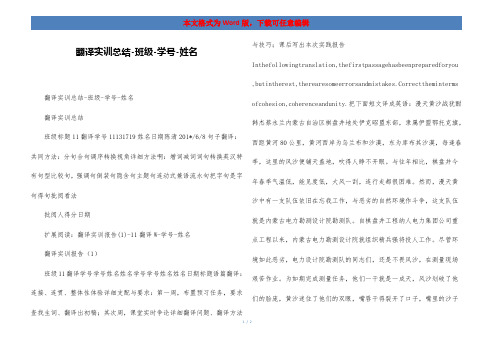
翻译实训总结-班级-学号-姓名翻译实训总结-班级-学号-姓名翻译实训总结班级标题11翻译学号11131719姓名日期陈清201*/6/8句子翻译:共同方法:分句合句调序转换视角详细方法啊:增词减词词句转换英汉特有句型比较句,强调句倒装句隐含句主题句连动式兼语流水句把字句是字句得句批阅看法批阅人得分日期扩展阅读:翻译实训报告(1)-11翻译W-学号-姓名翻译实训报告(1)班级11翻译学号学号姓名姓名学号学号姓名姓名日期标题语篇翻译:连接、连贯、整体性体验详细支配与要求:第一周,布置预习任务,要求查找生词、翻译出初稿;其次周,课堂实时争论详细翻译问题、翻译方法与技巧;课后写出本次实践报告Inthefollowingtranslation,thefirstpassagehasbeenpreparedforyou ,butintherest,therearesomeerrorsandmistakes.Correcttheminterms ofcohesion,coherenceandunity.把下面短文译成英语:漫天黄沙战犹酣韩杰蔡永兰内蒙古自治区棋盘井地处伊克昭盟东部,隶属伊盟鄂托克旗,西距黄河80公里,黄河西岸为乌兰布和沙漠,东为库布其沙漠,每逢春季,这里的风沙便铺天盖地,吹得人睁不开眼。
与往年相比,棋盘井今年春季气温低,能见度低,大风一刮,连行走都很困难。
然而,漫天黄沙中有一支队伍依旧在忘我工作,与恶劣的自然环境作斗争,这支队伍就是内蒙古电力勘测设计院勘测队。
自棋盘井工程纳人电力集团公司重点工程以来,内蒙古电力勘测设计院就组织精兵强将投人工作。
尽管环境如此恶劣,电力设计院勘测队的同志们,还是不畏风沙,在测量现场艰苦作业。
为如期完成测量任务,他们一干就是一成天,风沙划破了他们的脸庞,黄沙迷住了他们的双眼,嘴唇干得裂开了口子,嘴里的沙子能嚼出声音来,但同志们没有一个打退堂鼓。
经过不懈努力,棋盘井工程测量工作提前完成,为下一步设计阶段赢得了珍贵时间,为变电所按时开工打好了基础。
英汉翻译实践9

Unit 9I、课外练习参考译文:如果在11世纪作一项职业调查的话,也许会发现,竟有90%的人住在农村,依靠农耕、放牧、捕鱼或采伐谋生。
当时如果拍下一张航摄照片的话,可以看到未经铺设的道路连接的散落村子,中间隔着一片片的森林或沼泽。
也有几座城镇,但人口很少有超过一万的。
在14世纪中叶再拍一张照片,可以看到村子的数目多了,分布也广了,因为欧洲人开辟了新的定居地区,从而拓展了疆域。
道路上和江海上往来的人多了,他们把粮食或原料运往城镇。
城镇的数目多了,规模大了,重要性也增加了。
但是,如果在1450年前后拍一张照片的话,就会看到在此以前的几百年间几乎没有继续发展。
要想描写这几百年间农村的情形无法做到,困难有二。
首先,我们必须观察的是欧洲375万平方英里的大部分地区,而不仅仅是地中海一带地方。
其次,这一广阔地区的居民无法用我们的标准模式去进行划分,他们也不是一成不变。
1450年时可能大多欧洲人住在村落里,但有些地区山陵起伏,缺少沃土,或者砍伐过度,村落难以维持,只有一些孤独的牧民集居于此。
有些地区通往集市的交通较其他地区方便,因而从事商业性农业多于单一耕作。
大土地主比小地主更有可能对其地产,尤其是其领地,进行系统化的管理--而且作了记载,使我们得以从中了解有关本课题的大部分情况。
有些地区没有实施过多少封建统治,农民很少受到领主的管辖,甚至很少受到地主的管辖。
有些地区是新定居地,对租地户提供宽松的租赁条件来吸引他们开垦荒地。
最后一点是时代因素:作为12到15世纪时期特征的发展和繁荣所产生并具有的种种条件,并不适合在此之前的动荡岁月,也不适合在此之后的贫乏年代。
II、英汉翻译原理第四讲:怎样表达译文?(续)二、要避免照搬英汉词典的释义:(续)【例70】The team is famous for its arsenal of veteran players.【译文】这个球队拥有众多经验丰富的老队员,很有名气。
- 1、下载文档前请自行甄别文档内容的完整性,平台不提供额外的编辑、内容补充、找答案等附加服务。
- 2、"仅部分预览"的文档,不可在线预览部分如存在完整性等问题,可反馈申请退款(可完整预览的文档不适用该条件!)。
- 3、如文档侵犯您的权益,请联系客服反馈,我们会尽快为您处理(人工客服工作时间:9:00-18:30)。
翻译实训九第二节定语从句的翻译把英语的定语从句翻译成汉语,往往要在两个方面进行变化处理:第一是位置的变化。
定语从句在英语中永远放在先行词的后面,而翻译成汉语之后,它所表达信息的位置则可前可后,也可以杂糅在其他句子里。
第二是作用的变化。
表面上看,英语的定语从句起修饰作用,但是要把它的信息在汉语中得以通顺表达,往往需要把它的作用进行调整,如翻译成状语等。
这二者的变化有一定的联系:位置的变化影响到所表达信息在句子中的作用;而定语从句不起修饰功能时位置一般都要发生变化。
4.2.1 翻译成前置修饰语如前所述,英语定语从句永远在先行词的后面,而汉语的定语则在被修饰词的前面。
如果英语定语从句的信息量较小,就很容易翻译成汉语的前置修饰语。
I first heard this story a few years ago from a girl I had met in New York's Greenwich Village. The girl told me that she had been one of the participants.几年前我第一次听到这故事,是在纽约格林尼治碰到的一个女孩子说的。
她说当时那些人里有她。
这个定语从句所表达的信息"在纽约格林尼治碰到"和主句的信息比较起来强度很弱,所以翻译的时候位置没有做改动,依然被作为定语放在了先行词前面。
下面再举几例:1) He had been too proud to acknowledge the tenderness which his heart felt.他太骄傲了,不肯让心里的感情流露出来。
2) All the articles you see here have been sold.你在这里看到的一切商品都已售出。
3) This is the very spot where we camped last year.这就是我们去年野营的地点。
4) The people who worked for him lived in mortal fear of him.他手下的人对他都怕得要死。
5) Now it is proving itself not as a country which is threatened but asa country which is threatening others.现在证明它自己不是一个受到威胁的国家,而是一个威胁他国的国家。
6) It is a consolation to know that the successor surely carry on the cause for which he strove so faithfully all his life.了解到他的继承人一定会把他终身为之奋斗不渝的事业继承下来,这是件令人快慰的事情。
4.2.2 信息后置与作用的变化如果定语从句的信息量较大,它起的作用往往就不单是修饰的作用,而很可能是说明、叙述的作用。
按照汉语的表达习惯,就要把这些信息进行调整。
常用的有翻译成独立句、翻译成并列分句和翻译成状语从句三种不同的处理方法。
4.2.2.1 翻译成独立句即把定语从句和主句主语结合起来翻译成一个句子。
1) She had a balance at her banker's which would have made her beloved anywhere.她在银行的存款,足够使她到处受到欢迎的。
2) There were many wonderful stories to tell about the places I visited and the people I met.我访问了一些地方,遇到了不少人,要谈起来奇妙的事情多得很。
3) This living "side-by-side" may cause disagreements to develop between groups whose ways of life are very different from one another.各族生活方式极不相同,这种"并存"可能会在他们之间产生分歧。
4) He opposed the idea, as could be expected.正如所料,他反对这个意见。
5) The prayers and the meals, the lessons and the walk, which were arranged with a conventional regularity, oppressed her almost beyond endurance. 在这儿,祈祷,吃饭,上课,散步,都有一定的时候,这日子叫她怎么过得惯?6) My assistant, who had carefully read through the instructions before doing his experiment, could not obtain satisfactory results, because he followed them mechanically.虽然我的助手在动手做试验之前已从头到尾仔细地阅读了说明书,但由于他死搬硬套,不会灵活运用,所以不能取得满意的结果。
4.2.2.2 翻译成并列分句有的时候,定语从句所包含的信息值比较大,几乎可以和主句齐肩,那么这时候往往把它翻译成一个分句和原来的主句并列。
例如:1) Yet he failed somehow, in spite of a mediocrity which ought to have insured any man a success.按理说,他这样的庸才正该发迹才是,可不知怎么就是不得志。
2) They are striving for the ideal which is close to the heart of every Chinese and for which, in the past, many Chinese have laid down their lives. 他们正在为实现一个理想而努力,这个理想是每个中国人所珍爱的。
在过去,许多中国人曾为了这个理想而牺牲了自己的生命。
3) She knew that Amelia would tell her mother, who would probably tell Joseph.她知道爱米丽亚准会去告诉妈妈。
做妈妈的多半又会说给乔瑟夫听。
4) Nevertheless the problem was solved successfully, which showed the computations were accurate.不过问题还是圆满地解决了,这表明计算是正确的。
5) He failed his exam, which proves that he wasn't working hard enough. 他考试没及格,这证明他不够用功。
Anybody's better than Matt, who has neither honor, nor ability, nor capital.总之谁都比玛特强,他既没有面子,又没有能力,又没有资金。
4.2.2.3翻译成状语从句虽然从语法结构上讲定语从句属于修饰成分,修饰前面的先行词,但是从功能上来讲,它却可能和句子其他成分一起构成因果、转折等关系。
所以有的时候定语从句就被翻译成了状语从句。
如下例:1) She's furious at the goat, which got on the wrong side of the fenceand is eating her flowers.她对那只山羊大发雷霆,因为那只山羊跑到篱笆那边正在吃她种的花。
(原因)2) Private schools in the United States have a wide range of programs that are offered to meet the needs of certain students.美国私立学校课程繁多,以满足学生的不同需求。
(目的)3) We know that a cat whose eyes can take in many more rays of light than our eyes can see clearly in the night.我们知道由于猫的眼睛比我们人的眼睛能吸收更多的光线,所以猫在黑夜也能看得很清楚。
(原因)4) He insisted on building another house which he had no use for.他坚持要建造一幢房子,尽管他并无此需要。
(转折)5) The imperialist states maintain enormous armies and gigantic navies which are used for oppressing and exploiting the people in distant lands. 帝国主义国家维持了庞大的陆海军,用以压迫和剥削远处的人民。
(目的)6) The stems of bamboo are hollow, which makes them very light.竹干是空心的,所以很轻。
(结果)7) We have to oil the moving parts of the machine, the friction of which may be greatly reduced.我们必须给机器的传动部件加油,这样可以大大减少其摩擦力。
(目的)8) Computers, which have many uses, cannot completely take the place of humans.虽然计算机有许多用途,但它不能完全代替人。
(让步)9) The sun heats the earth, which makes it possible for living things to grow.太阳给地球热量,这就使得生物能够生长。
(结果)10) How can anyone hope to be a political leader who doesn't even know what his neighborhood are thinking?一个人如果连自己的左邻右舍在想些什么都不知道,怎么能指望成为一个政治领袖呢?(条件)练习4.2一、试译下列句子,注意各种技巧的应用。
